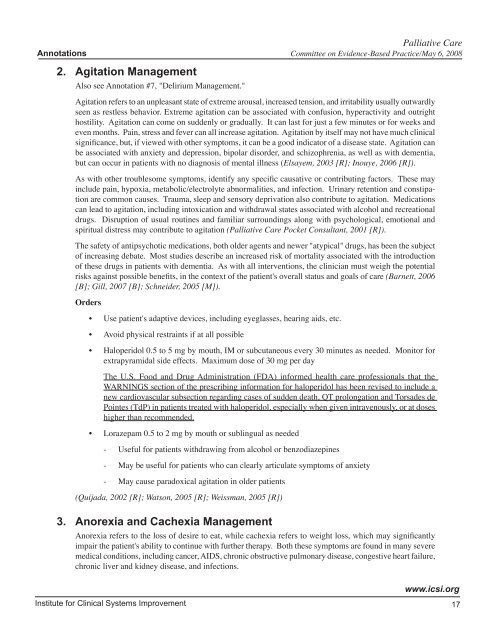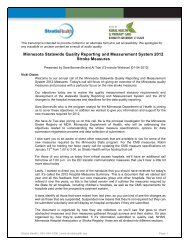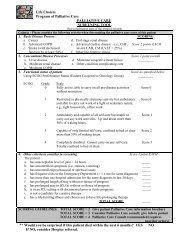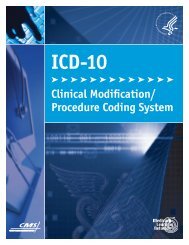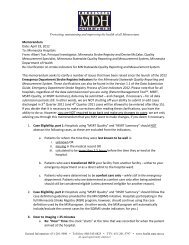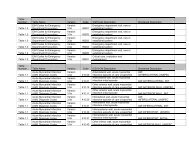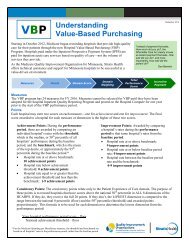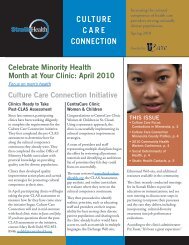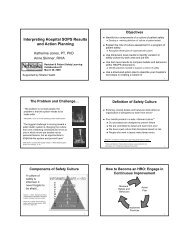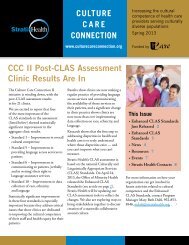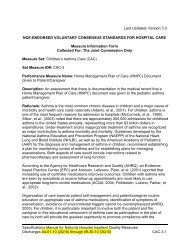Palliative Care Order Set - Stratis Health
Palliative Care Order Set - Stratis Health
Palliative Care Order Set - Stratis Health
Create successful ePaper yourself
Turn your PDF publications into a flip-book with our unique Google optimized e-Paper software.
<strong>Palliative</strong> <strong>Care</strong><br />
Annotations Committee on Evidence-Based Practice/May 6, 2008<br />
2. Agitation Management<br />
Also see Annotation #7, "Delirium Management."<br />
Agitation refers to an unpleasant state of extreme arousal, increased tension, and irritability usually outwardly<br />
seen as restless behavior. Extreme agitation can be associated with confusion, hyperactivity and outright<br />
hostility. Agitation can come on suddenly or gradually. It can last for just a few minutes or for weeks and<br />
even months. Pain, stress and fever can all increase agitation. Agitation by itself may not have much clinical<br />
significance, but, if viewed with other symptoms, it can be a good indicator of a disease state. Agitation can<br />
be associated with anxiety and depression, bipolar disorder, and schizophrenia, as well as with dementia,<br />
but can occur in patients with no diagnosis of mental illness (Elsayem, 2003 [R]; Inouye, 2006 [R]).<br />
As with other troublesome symptoms, identify any specific causative or contributing factors. These may<br />
include pain, hypoxia, metabolic/electrolyte abnormalities, and infection. Urinary retention and constipation<br />
are common causes. Trauma, sleep and sensory deprivation also contribute to agitation. Medications<br />
can lead to agitation, including intoxication and withdrawal states associated with alcohol and recreational<br />
drugs. Disruption of usual routines and familiar surroundings along with psychological, emotional and<br />
spiritual distress may contribute to agitation (<strong>Palliative</strong> <strong>Care</strong> Pocket Consultant, 2001 [R]).<br />
The safety of antipsychotic medications, both older agents and newer "atypical" drugs, has been the subject<br />
of increasing debate. Most studies describe an increased risk of mortality associated with the introduction<br />
of these drugs in patients with dementia. As with all interventions, the clinician must weigh the potential<br />
risks against possible benefits, in the context of the patient's overall status and goals of care (Barnett, 2006<br />
[B]; Gill, 2007 [B]; Schneider, 2005 [M]).<br />
<strong>Order</strong>s<br />
• Use patient's adaptive devices, including eyeglasses, hearing aids, etc.<br />
• Avoid physical restraints if at all possible<br />
• Haloperidol 0.5 to 5 mg by mouth, IM or subcutaneous every 30 minutes as needed. Monitor for<br />
extrapyramidal side effects. Maximum dose of 30 mg per day<br />
The U.S. Food and Drug Administration (FDA) informed health care professionals that the<br />
WARNINGS section of the prescribing information for haloperidol has been revised to include a<br />
new cardiovascular subsection regarding cases of sudden death, QT prolongation and Torsades de<br />
Pointes (TdP) in patients treated with haloperidol, especially when given intravenously, or at doses<br />
higher than recommended.<br />
• Lorazepam 0.5 to 2 mg by mouth or sublingual as needed<br />
- Useful for patients withdrawing from alcohol or benzodiazepines<br />
- May be useful for patients who can clearly articulate symptoms of anxiety<br />
- May cause paradoxical agitation in older patients<br />
(Quijada, 2002 [R]; Watson, 2005 [R]; Weissman, 2005 [R])<br />
3. Anorexia and Cachexia Management<br />
Anorexia refers to the loss of desire to eat, while cachexia refers to weight loss, which may significantly<br />
impair the patient's ability to continue with further therapy. Both these symptoms are found in many severe<br />
medical conditions, including cancer, AIDS, chronic obstructive pulmonary disease, congestive heart failure,<br />
chronic liver and kidney disease, and infections.<br />
www.icsi.org<br />
Institute for Clinical Systems Improvement<br />
17


